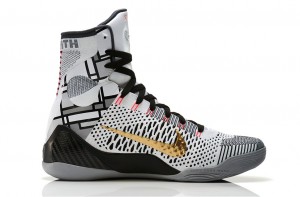
By Matt Tulli
For this basketball season, I was lucky enough to get two pairs of basketball shoes: One for practices, and one for games. Sometimes I’ll wear my game shoes to practice but I try to keep them as clean and in good condition as possible. I asked my parents if I could get two pairs before the season started, and they agreed, in part because I told them I’d promise to take good care of them, but also because I got them both at discounted prices; one through the basketball team shoe sale, and the other with a coupon I found (well, it was for free shipping but it still counts).
I am completely grateful for the things my parents provide for me and I realize I am lucky to have been able to get these two pairs of shoes, and my parents were not struggling to afford them. I’m grateful because I realize there are families out there that are saving up and digging into their pockets to pay for basketball shoes for their sons and daughters. And in some cases, the kids themselves are required to pay for them.
This is where the problem comes in for many people with regard to these multi-billion dollar companies charging upwards of $160 dollars for a pair of shoes for aspiring basketball players, who may not even make the team this year. And even more than that, the shoes aren’t even durable enough to last a full calendar year with all the open gyms and basketball workouts coaches are holding nowadays (and I’m not blaming this on the basketball shoe manufacturers).
Although it is unclear exactly how much money it costs Nike to produce one pair of shoes (materials, labor, shipping, packaging costs), we can assume based on a study by the Portland Business Journal that one pair of regular, $100 shoes costs Nike about $28.50 to manufacture. Nike then sells these to retailers at around $50 for around a $12 to $13 profit. This is called the wholesale price. Then, the retailers mark the price up usually 100 percent.
One hundred percent.
Fifty dollars marked up 100 percent is $100.
So, it’s the retailers who are making us shell out all this money?
Well, no. You see, retailers are businesses too. They need to make money to keep their businesses going. That’s why the J.Crew Factory Store can get away with 60 percent off the entire store plus 15 percent off after Christmas. They aren’t a separate business, as the J.Crew Factory Store manufactures their goods and sells them directly to the consumer, eliminating the “middle man” of another store.
These retailers, such as Dick’s Sporting Goods, Foot Locker or Nordstrom need to make money too, for rent, marketing and profit. The manufacturers need these retailers to market and sell their products. That’s why retail stores can be so lucrative.
But, that brings up the issue of Nike.com, and why Nike can get away with selling Kobe 9 Elite shoes for $225 when they don’t have to sell it to a retailer. Well, basically, the price is always going to be the same, whether at a retail store or outlet store. If not, why would consumers spend money at retail stores instead of buying them for a cheaper price at an outlet store? The fact is, Nike really wants you to buy apparel, especially basketball shoes, straight from Nike.com, because they’re able to eliminate the “middle man”: retailers. So, instead of making the small profit of when retailers buy their products in order to resell them, they can just sell the product at the ridiculous retail price for a larger profit.
There are multiple reasons why prices of basketball shoes are going up. These include inflation (about .8 percent per year during the past decade according to inflationdata.com), demand for these popular shoes, and other smaller factors such as the cost to advertise for these shoes, and newer technologies being introduced into basketball shoes. High-end athletes are asking more and more money for these contracts: Superstar Kevin Durant recently signed a $300 million deal to stay with Nike, for example.
So, in review: While people may not like the prices of basketball shoes (myself included), it is what it is. Prices of shoes can be justified by demand for shoes, inflation, and other aforementioned factors. If shoes are going to sell at a high price, Nike is going to continue to sell them at a high price. If nobody buys the shoes, then Nike will have to sell them at a lower price. But that doesn’t seem like it’s going to happen anytime soon.
Nike.com and Nike iD (where buyers can customize shoes to their liking) are where Nike makes most profit. When selling to a retail store such as Dick’s Sporting Goods, Nike sells the shoes to them for about 50 percent of their retail value, then are marked up by the retailers. While these retailers may seem like the main culprit, they are businesses too and must make money to stay in business; this is achieved by marking up the shoes.